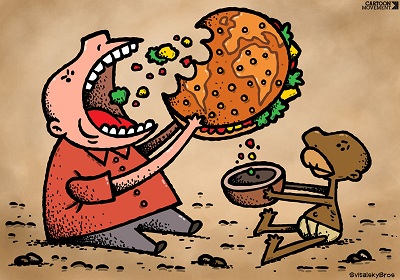Unsustainable consumption – the mother of all environmental issues?
- Ayrıntılar
- Üst Kategori: ROOT
Cions of the world.onsumption of products and services impacts the environment in many different ways. For example, the things we buy contribute, directly or indirectly through the product lifecycle, to climate change, pollution, biodiversity loss and resource depletion in Europe and other reg
 Another kind of consumption is possible, however. This is the subject of Sustainable consumption in a time of crisis, a meeting hosted on 15 March by the European Environment Agency (EEA); and organised by the European Economic and Social Committee (EESC) and the Danish Consumer Council. The event marks International Consumer Day.
Another kind of consumption is possible, however. This is the subject of Sustainable consumption in a time of crisis, a meeting hosted on 15 March by the European Environment Agency (EEA); and organised by the European Economic and Social Committee (EESC) and the Danish Consumer Council. The event marks International Consumer Day.
“Continuing with current consumption patterns in Europe is not an option,” EEA Executive Director Jacqueline McGlade said. “As both population and purchasing power swell worldwide, resources will be ever more overused and constrained. Europe must take the lead in exploring a new model of consumption which does not compromise the needs of others or of future generations, nor damage the environment.”
The meeting will look at ways the economy can be adjusted to drive sustainable forms of consumption. It will consider how the recession in Europe creates opportunities and constraints for policy makers hoping to boost the ‘green economy’. The meeting is particularly timely, as green economy is one of the priority discussion points of the landmark sustainable development summit in Rio de Janeiro in June this year.
Some facts about consumption
- Europe consumes more resources than most other regions. An average European citizen uses about four times more resources than one in Africa and three times more than one in Asia, but half of one in USA, Canada or Australia
- Resource use in Europe is increasing. Resource use per person increased by 9.1% in the EU-27 between 2000 and 2007, reaching some 17 tonnes per person annually. Of the 8.2 billion tonnes of materials used in the EU in 2007, minerals and metals accounted for more than half, while fossil fuels and biomass were approximately a quarter each.
- Europe can use resources more efficiently. 87% of EU citizens agree that Europe could use its natural resources more efficiently, and 41% think that their household produces too much waste.
- Europeans use more and more space to live on. The average floor area of dwellings increased from 81 to 87 m² since 1990, while the number of people per household decreased from 2.8 to 2.4.
- Europeans travel more kilometres by car. Although cars on average become more fuel-efficient, overall fuel consumption for private cars does barely go down, mainly because more kilometres are driven.
- An estimated 89 million tonnes of food ends up as waste each year in the EU. This is roughly 180 kg per citizen, wasted in households, manufacturing, shops and restaurants. In the UK, 25% of food purchased is thrown out, of which nearly two-thirds could have been eaten.
- Consumption indirectly uses water. For example, a cheeseburger requires 2,400 litres of water to produce, including the bread, beef and cheese. There are also indirect greenhouse gas emissions from our consumption. Staying with the burger example, producing the average patty results in more carbon emissions than driving 15 km in a large car.
- Current consumption leads to unsustainable waste levels. In 2008, every citizen on average threw out 444 kg of household waste, and indirectly generated 5.2 tonnes of waste in the European economy. And this is just in the EU - no data are available on waste generated from producing products and materials imported from other regions.









